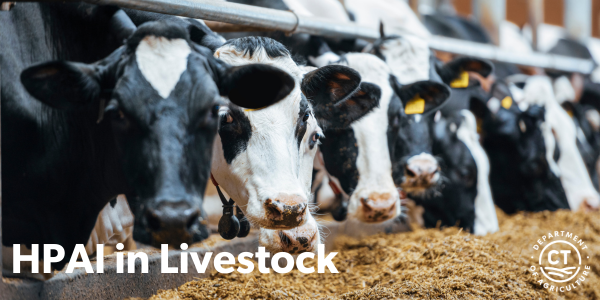
In March 2024, HPAI H5N1 was first detected in dairy cows. To date there have been no confirmed cases of HPAI H5N1 in dairy cattle in Connecticut.
HPAI Confirmed Cases in Livestock
CT Department of Agriculture is working in collaboration with federal officials and the industry to trace animal movements, implement testing activities, support producers, and protect farmworkers.
REPORTING
To report ill dairy cattle, contact your veterinarian, the State Veterinarian at 860-713-2505 or ctstate.vet@ct.gov, or the USDA APHIS Area Veterinarian in Charge, Bradley.Keough@usda.gov or 508-363-2290.
BIOSECURITY
H5N1 can be transmitted on equipment, people, or other items that move from farm to farm, including between dairy farms and poultry facilities. Practicing good biosecurity practices is critical to limit the spread. Financial assistance is available to farms for planning and implementing enhanced biosecurity measures.
Preventative Actions
- Use one entrance and exit for the farm, limiting access to only those who need to be there.
- Use disinfectant solution to clean footwear before entering the farm, and give visitors disposable shoe covers
- Disinfect all vehicle and trailer tires and don’t borrow tools/equipment from other farms
- Keep all wild animals away from bird and livestock areas
- Keep livestock and pets away from other animals and birds, including feed, litter, and equipment.
Signs of H5N1 in Dairy Cattle
- Reduction in milk production
- Thicker, concentrated colostrum-like milk
- Decrease in feed consumption
- Lethargy
- Dehydration
- Fever
FARMWORKER SAFETY
- Wear personal protective equipment (PPE) when working with or around cattle and raw milk that are suspected or confirmed with H5N1
- Recommended PPE includes:
- Properly fitted vented safety goggles or a face shield
- Disposable gloves
- Boots or boot covers
- N95 respirator
- Disposable fluid-resistant coveralls
FOOD SAFETY
According to the U.S. Department of Agriculture, Food and Drug Administration, and the Centers for Disease Control and Prevention, the commercial milk supply remains safe due to both federal animal health requirements and pasteurization.
Pasteurization is a process of heating milk to a specific temperature over time killing harmful bacteria and viruses. Research has shown that pasteurization inactivates the virus keeping the commercial milk supply safe.
RESOURCES

